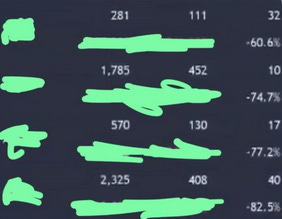After receiving a bunch of clients, we have observed noticeably many portfolio. All of them are bad and some are worse than others. However, they usually look like something below:
More often than not, many stocks have gone down 30%, 40% all the way to 90% in value. They should be sold immediately because they no longer have good prospects. The ugliness in prospects may take in the form of the following:
Bad owners (sometimes key owner is even already in prison)
Ungodly huge debt that is most likely not repayable
End of the cycle and too late to be sold
and many others.
When we kindly ask our new clients to consider selling these losing stocks and recoup a bit of funds to purchase better stocks, sometimes they refuse to do so completely with a simple reason:
One day, would the price of the stocks go back up to my original buying price?
Hope is not a Good Investment Strategy
Granted, the answer to the question above to be frank is we don’t know, but unlikely especially if the price has gone down by a significant percentage (gentle reminder that we do not have the power to see the future with 100% certainty).
However, we are certain that hope is not a good investment strategy because a good investment strategy is one that would be maximising our chances of consistently growing our portfolio value overtime.
Hope is the opposite of maximising those chances because when we hope too much, we often neglect and overlook the very reason why we bought our stocks in the first place.
Is it because an investment guru told you that it was a good stock?
Because it has a target price 2x of your original buying price?
Because all your friends are buying it?
If you are only focused on hoping and nothing else, we suppose that “investing” becomes quite akin to gambling. When you go to a casino, you would hope that you could win because you are “promised” that you can win a jackpot. However, could you reliably expect to win over and over again in the long run?
What is Better than Hope?
A working framework which you can follow consistently.
It does not matter if you invest based on fundamentals, technical, bandarmology, or a mix of everything. If you have backtested your method and it is proven to work. Then all you need to do is to follow it consistently and make adjustments here and there along the way.
For example:
You could buy a stock with an exceptionally good fundamentals (great earnings and management) that has amazing prospects. Your thesis is that the company will grow in size signficantly in the coming year, so buying it now at current prices is a steal.
Once invested, your job is to question continuously whether the thesis still holds. If it no longer holds, sell immediately. Otherwise keep hodling.
We genuinely hope that our take is useful for your investment journey.


